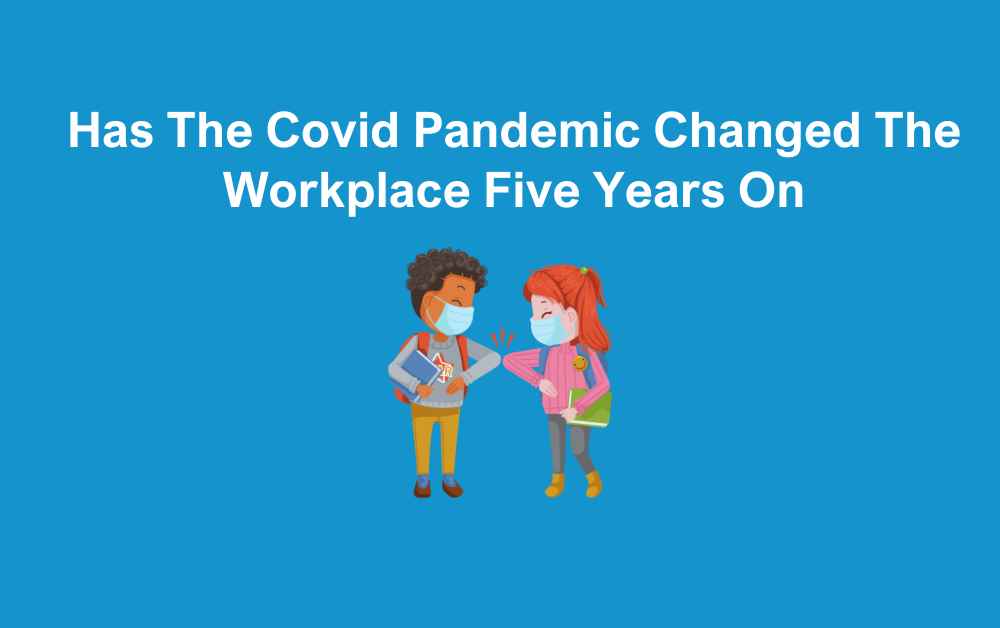This week marks five years since the rise in the Covid pandemic and the first Covid-19 lockdown—a moment in history that still feels surprisingly recent. We all remember where we were when the news broke, and the uncertainty that followed. Schools were closed, staff were asked to work from home, and a furlough scheme was eventually introduced to protect jobs.
Over the past five years, the workplace has evolved in many ways, from the rise of remote and hybrid working to shifts in employee expectations and company culture. However, some aspects of work have remained unchanged, while others are gradually reverting to pre-pandemic norms. As we reflect on this milestone, it is worth considering how the workplace has evolved and what the future may hold.
Remote Working
As part of Government Covid pandemic guidance, staff were told not to go to their place of work unless they had certain ”key worker” roles. For businesses who weren’t set up for remote working, they had to quickly supply staff with equipment and anything they needed to be able to work from home. As a result, remote working became the norm for many organisations.
Five years on, we are seeing a shift back towards pre-pandemic working arrangements, with a growing number of businesses mandating a return to the office. High-profile companies such as Amazon and Asda have made headlines for enforcing such policies, often citing the need to enhance collaboration and cultural alignment.
Despite this shift, hybrid working remains a key feature of the modern workplace. Many businesses recognise its value in attracting and retaining top talent, offering employees the flexibility they have come to expect. The Office for National Statistics (ONS) reported that over a quarter of UK workers followed a hybrid model last Autumn. This demonstrates that while in-office presence is being re-emphasised, a fully office-based approach is no longer the default for many organisations. This is one of the key changes since the beginning of the Covid pandemic.
Mental Health and Wellbeing
After months of being stuck indoors, a lot of employees started to struggle with their mental health. This along with the mandate requesting staff to be vaccinated before returning to the office brought mental health and wellbeing to the top of the agenda for employers. A CIPD survey completed by HR professionals in 2024 found that 53% of businesses have standalone mental health strategies. It also showed that 43% continue to support employees with their mental health today.
It is encouraging to see employers continuing to support their workforce. However, the lasting mental and physical effects of Covid-19 are still a reality. Long Covid remains a significant challenge for many employees, and research from University College London highlights its staggering economic impact, costing billions each year. Therefore, workplaces still have a long way to go when it comes to mental health and wellbeing in the workplace.
Adapting Better to Change
The Covid pandemic and lockdowns forced individuals and businesses to adapt quickly, fostering resilience, innovation, and flexibility. The shift to remote work and rapid digital adoption made organisations more agile and prepared for future disruptions. Workplace structures evolved, proving hybrid models can maintain productivity outside physical offices. A greater focus on mental well-being and work-life balance became a lasting priority.
This period reinforced the importance of continuous learning, problem-solving, and collaboration. Many businesses pivoted, individuals upskilled, and communities supported each other. These experiences strengthened our ability to handle uncertainty, ensuring we are better prepared for future challenges with confidence.
The Emergence of AI
One of the most significant developments since the Covid pandemic has been the rise of artificial intelligence (AI) in the workplace. While automation and AI-driven tools were already gaining traction before 2020, the rapid shift to digital solutions during lockdowns accelerated their adoption. Businesses had to find ways to maintain productivity remotely, and AI-powered technologies—such as chatbots, virtual assistants, and automated workflows—became indispensable.
Fast forward to 2025, and AI has become a central component of many workplace operations. From streamlining recruitment processes to enhancing customer service and improving data analysis, AI is reshaping the way businesses function. The rise of generative AI tools, like ChatGPT and other language models, is enabling companies to automate routine tasks, boost efficiency, and drive innovation.
However, the increased use of AI also brings challenges. This is particularly regarding job security, ethical concerns, and the need for digital upskilling. Employers must balance efficiency with responsible AI usage, ensuring that employees are supported with training and development opportunities to adapt to an evolving digital landscape. As AI continues to integrate into our daily work, its role in shaping the future workplace cannot be ignored.
Conclusion
Reflecting on the past five years since the beginning of the Covid pandemic, it is evident that the pandemic triggered lasting changes in the way we work. Remote and hybrid working have become ingrained in many organisations. This is despite some employers push for a return to office-based models. Mental health and wellbeing have taken centre stage, with many businesses continuing to prioritise employee support. The ability to adapt to change has become a critical skill, allowing businesses and individuals to navigate ongoing challenges with greater resilience.
Moreover, the rapid emergence of AI is shaping the workplace in ways that were unimaginable just a few years ago. As businesses continue to evolve, embracing technological advancements and flexible work arrangements, the key to future success will be adaptability. The pandemic taught us that change is inevitable, and those who can innovate and remain agile will thrive in the years to come.
As we mark five years since the first Covid-19 lockdown, we are reminded of how much the world of work has transformed. While some aspects may return to pre Covid pandemic norms, others are here to stay. What remains clear is that the workplace will continue to evolve. It will continue to be shaped by new technologies, changing employee expectations, and the lessons learned from one of the most disruptive periods in modern history.







